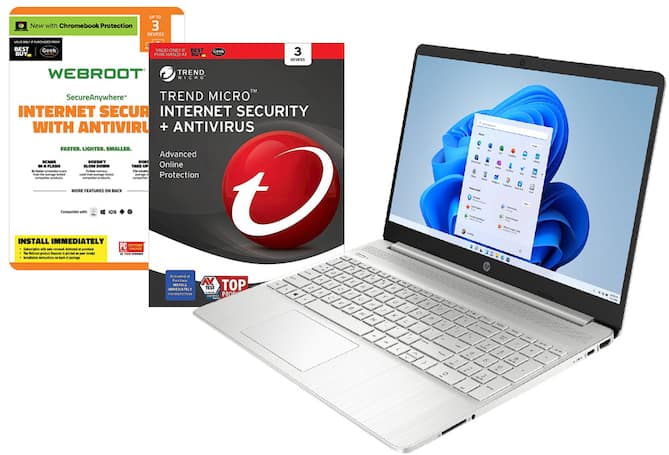No content
Top Tips for Enhancing Home Internet Security

Best Selling Products carousel(6 Items)
As the digital world becomes increasingly intertwined with our daily lives, it’s more important than ever to make sure you have robust internet security. Our home computers, where we store valuable personal and financial information, are prime targets for cybercriminals. From online banking and shopping to streaming and smart home devices, security threats can come from multiple angles.
By implementing a few essential internet security practices, you can fortify your digital fortress and protect yourself and your family from online threats. Let’s explore the most important internet security tips for your home.
Setting the stage for your digital security
Your home Wi-Fi network is the gateway to the wide open internet. Since it’s ubiquitous in most homes, it’s easy to take your network for granted and forget that it can still be at risk for attacks. Luckily, there are several ways to set your network up for success, including internet security software, firewall security and antivirus protection.
Create internet security by changing your password
Protect your network by changing the default administrator username and password, which are often well-known and easily exploited. Choose a strong, unique password comprising a combination of letters, numbers and symbols. Additionally, enable WPA2 or WPA3 encryption to ensure data transmitted over your network remains secure.
Keep your devices updated
Regularly updating your devices' software is a simple yet effective way to enhance security. Operating system updates often include vital security patches that address vulnerabilities discovered by developers. Enable automatic updates whenever possible, or check for updates manually and install them promptly.
Enable two-factor authentication (2FA)
Two-factor authentication provides an additional layer of security by requiring users to provide two forms of identification before accessing an account. Enable 2FA whenever it is available, especially for your email, social media and financial accounts. This way, even if your password is compromised, unauthorized access becomes significantly more challenging.
Be cautious of phishing attempts
Phishing remains one of the most prevalent online threats. Exercise caution when interacting with emails, messages or websites asking for personal information, especially login credentials or financial details. Avoid clicking on suspicious links and be wary of unsolicited attachments. Verify the authenticity of the sender or website by contacting the organization directly if necessary.
Install reliable antivirus protection and a firewall
Install reputable antivirus software and keep it up to date. Norton Anti-Virus, McAfee Antivirus and Microsoft Security Essentials are a few of the most reliable brands of security software with a longstanding reputation. The best antivirus software will not bog down your computer performance, and will be intuitive enough that you can install and use it correctly. Regularly use a malware scanner to check for viruses and other malicious software. Additionally, enable network firewalls on your devices and home network to create a barrier between your devices and potential intruders. A firewall is an excellent first line of defense, but having multiple layers of internet security software is key to keeping your network locked down.
Practice safer online shopping and banking
When you’re making online purchases or conducting banking transactions, only use secure, reputable websites. Look for "https://" and the padlock symbol in the browser's address bar, indicating an encrypted connection. Avoid making transactions over public Wi-Fi networks, as they are often insecure and vulnerable to eavesdropping.
Secure your router
The router is the gateway to your home security network. Begin by changing the default username and password provided by the manufacturer. Choose a strong, unique password that combines letters, numbers and special characters. Additionally, keep your router's firmware up to date by checking for updates regularly. New firmware versions often address security vulnerabilities and enhance overall performance.
Implement a guest network
Setting up a guest network on your computers and tablets separates your primary network from visitors' devices, reducing the risk of unauthorized access to sensitive information. Ensure your guest network is password protected and has a different password from your main network. Limit the guest network's access to the internet and restrict its access to other devices on your network.
Use a virtual private network (VPN)
A VPN encrypts your internet connection and routes your traffic through a secure server, protecting your data from eavesdropping and potential hackers. Consider using a reputable VPN service, especially when connecting to public Wi-Fi networks or accessing sensitive information remotely.
Secure your smart home devices
If you’re just learning what the Internet of Things (IoT) is all about, you may have been more familiar with them than you realized. The IoT refers to smart home devices, such as smart speakers, cameras and thermostats, all of which can introduce vulnerabilities to your network. Change default usernames and passwords on these devices, as cybercriminals often target them. Regularly update their firmware and review the privacy and security settings to maximize protection.
Educate family members
Make sure all family or household members using your home network are aware of best practices for internet security. Teach them about the risks of downloading files from unknown sources, clicking on suspicious links and sharing personal information online. Encourage them to use strong, unique passwords and be cautious of phishing attempts.
Create a digital safe haven with the right security software and practices
Maintaining robust internet security at home is essential for protecting your sensitive data and ensuring a safe online experience. By following these important internet security tips, such as securing your Wi-Fi network, installing a firewall security and antivirus software, using strong passwords and being cautious, you can significantly reduce the risk of falling victim to cyber threats. Remember, online security is an ongoing endeavor that requires diligence, awareness and a proactive approach to stay one step ahead of potential attackers.